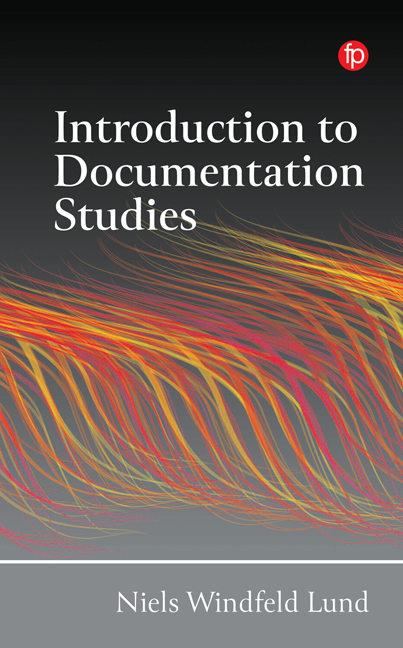 Introduction to Documentation Studies
Introduction to Documentation Studies 11 - A Complementary Discipline of Documentation, Information, and Communication
Published online by Cambridge University Press: 28 March 2024
Summary
Introduction
Out of this book comes a vision for a new general scientific discipline of documentation, information, and communication studies, DIC studies.
Overall, DIC studies can be defined as:
The study of the documentative, informative, and communicative processes taking place in human interaction through systematic complementary and comparative study of documentation forms, document management, and document design:
• documentation forms, traditions in different subsystems, cultures, societies, criteria for quality and truth;
• document management, preservation, storage, indexing, accessibility;
• document design, experimental document analysis.
This is the vision I started to outline in the first draft of this book in 2001, in Berkeley, California, to which the late Professor Patrick Wilson at UC Berkeley commented: ‘You are on the right track, you will meet enemies, you will have to fight for it, get back to work!’
It is also the vision I have had the privilege to present to my students both in Tromsø at Documentation Studies and at UC Berkeley at SIMS/Information School, as well as in the international forum for document studies, The Document Academy, at its annual meetings, DOCAM.
Facing realities
To suggest a new general discipline may be a relatively easy task, but to turn it into reality is something else.
Timothy Lenoir wrote:
Disciplines are dynamic structures for assembling, channeling, and replicating the social and technical practices essential to the functioning of the political economy and the system of power relations that actualize it.
(Lenoir, 1993, 72)This means that in suggesting a new discipline, one is entering a battlefield of competing disciplines, paradigms, interdisciplinary constructions, etc.
The LIS field
As the vision was suggested within and as a result of working in the LIS field, the library and information science field, it was natural that the first challenge was to see if this vision was a subfield within LIS or an attempt to redefine the LIS field as a whole.
Without trying to describe the LIS field and its many different versions, I think it is fair to say that there has been a consensus about studying ‘human recorded information’ (Bawden and Robinson, 2022). Most LIS people may also agree to define the field in this way:
Information science is the rational and systematic study of the way information is created, stored, indexed, disseminated and used. (Robinson, 2009)
Information
- Type
- Chapter
- Information
- Introduction to Documentation StudiesComplementary Studies of Documentation, Communication and Information, pp. 145 - 150Publisher: FacetPrint publication year: 2024